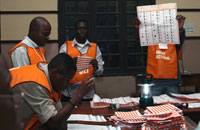 As the fever of the electoral results dominates the focus of the Congolese media and election candidates, the electoral authorities have made a call to order by denouncing “obvious violations of the electoral law”.
As the fever of the electoral results dominates the focus of the Congolese media and election candidates, the electoral authorities have made a call to order by denouncing “obvious violations of the electoral law”.
The electoral law prohibits the media or the candidates to diffuse their own compilations of partial results, but some did not wait to publish “tendencies” and began announcing premature winners.
In a united official statement, the High Authority of the Media (HAM) and the Independent Electoral Commission (IEC) denounced this practice as “dangerous”, and challenged these media on “their responsibilities, which does not authorise them to endanger the future of the nation.”
These institutions in support of democracy finally threatened sanctions “as far as closure”, of the media responsible for breaking the electoral law.
The International Committee that supports the Transition (CIAT), also said they were worried by “the abuse by certain media and political actors of partial and incomplete results, which sows disorder in the spirit of Congolese citizens, and threatens law and order”. The CIAT comprises international partners who support the process of the DRC democratic transition.
The IEC, who are the only ones entitled by the electoral law to publish the provisional results of the elections, have estimated that the results of the presidential elections will not be available before August 20. The results of the legislative elections will be published gradually by district, when they have been consolidated on a district level.
The presidential elections covers all the Congolese territory, therefore the IEC decided not to publish partial results for the presidential ones, and to only proclaim complete results.
The individual results of the 50,000 polling stations are to be forwarded to the 62 IEC local centres of results compilation, where they will be consolidated before publication.
This technical operation of consolidation is in progress, in the presence of witnesses of the political parties and of electoral observers. The process could last some weeks.
The provisional results published by the CEI could then be possibly disputed by the candidates through the courts of jurisdiction (Supreme Court for the presidential elections, Courts of Appeal for the legislative elections), which will then only be entitled to proclaim the final results.
Related articles
- • Kabila's Party Loses Seats in Parliament, Increasing Reliance on Allies (February 3, 2012)
- • Tshisekedi Says He Will Form His Government Next Week (January 21, 2012)
- • Tshisekedi Stages Self-Inauguration at Home (December 23, 2011)
- • In Inauguration Speech, Kabila Vows to Speed Up Modernization (December 21, 2011)
- • Tshisekedi Says He Is President-Elect, Asks Security Forces to Arrest Kabila (December 18, 2011)
- • Tshisekedi Says He Won, Can He Prove It? (December 17, 2011)
- • Supreme Court Rules Joseph Kabila Won Presidential Election (December 16, 2011)
- • Supreme Court Hears Appeal on Presidential Election (December 15, 2011)
- • Presidential Election Results Not Truthful, Says Cardinal Monsengwo (December 13, 2011)
- • Joseph Kabila Wins Presidential Election (December 9, 2011)
- • 19,497 Candidates to Run for 500 Seats in Parliament (September 26, 2011)
- • Kabila's Election Speech Leads to Judges' Strike (September 20, 2011)
- • Eleven Candidates to Run for President (September 15, 2011)
- • 31 Million Registered to Vote (July 20, 2011)
- • Parliament Approves Constitutional Amendments (January 16, 2011)
- • Parliament to Tackle Elections, 2011 Budget during September Session (September 14, 2010)
- • IEC: Elections to Cost $712 million (August 14, 2010)
- • Malu Malu Challenges Opponents of Elections Timetable (August 12, 2010)
- • Opposition, Civil Society Reject Elections Timetable (August 11, 2010)
- • Electoral Commission Sets Date for 2011 Presidential Election (August 9, 2010)
- • Kabila Signs Bill Creating New Electoral Commission (July 30, 2010)
- • Government, IEC Confirm 2011 Elections (April 27, 2010)
- • Voter Registration Extended for 15 Days in Kinshasa (August 4, 2009)
- • Voter registration preparations underway (May 5, 2009)
- • France contributes one million euros to support the electoral process in the DRC (August 28, 2008)
- • Yves Kisombe expelled from the MLC (April 25, 2008)
- • Launch of a Parity Observatory in the DRC (March 6, 2008)
- • Comment: Judicial Appointments Violate Constitution (February 29, 2008)
- • Chaos in the Courts (February 27, 2008)
- • UN SC authorizes MONUC to organize, conduct local elections (January 31, 2008)







